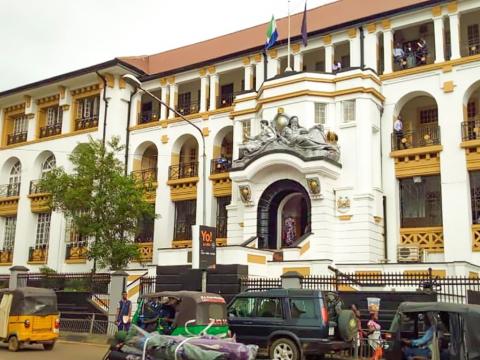By Mohamed Jaward Nyallay
The Supreme Court of Sierra Leone is expected to commence hearing in a landmark case this week on Islamic marriage.
Women’s rights campaigner and lawyer, Fatmata Sorie, is championing the case which is seeking clarity specifically on divorce in marriages conducted under Islamic law.
Lawyer Sorie, who is president of the all-female campaign group Legal Access through Women Yearning for Equal Rights and Social Justice (LAWYERS), told Politico that the case came about as part of her work representing women who were summarily divorced by their husband.
Four cases of such women inspired her to go to the Supreme Court, she said.
Islamic marriage in Sierra Leone is conducted under the Mohammedan Marriage Act of 1960. The law only recognizes such marriage as valid and requires that the registration of such marriage is done in accordance with Islamic laws. The Act, however, does not provide for divorce, leaving that aspect to be determined by Islamic scholars.
Mrs Sorie said this way many women have helplessly watched as their marriages were dissolved by simple utterances from their husbands.
The activist is seeking clarity on whether the state’s law doesn’t have jurisdiction on the dissolution of such marriages.
“The law is not so clear that the court does not have jurisdiction over Mohammedan marriage. What it is clear about is that it gives the Muslim community the right to carry out the marriage process and to do the registration. So you cannot go and say simpliciter that the court does not have jurisdiction on the dissolution of this marriage,” she explained in an interview.
“The system has always insisted that you cannot engage issues relating to Mohammedan marriage; that it is out of the jurisdiction of the court. We have had situations where lots of women are prejudiced just by the way Mohammedan divorce is being carried out and the fact that they are not going through the process,” she added.
Besides the Mohammedan Marriage Act, there are also the Christian Marriage Act and the Civil Marriage Act in Sierra Leone.
Mrs Sorie explained that while the processes of divorce in Islamic marriage requires that the case is taken to the mosques where the marriage was done, in many cases they go to any other mosques and often there is hardly any effort to dialogue to salvage the marriage.
“Many a time the women are not part of the (divorce) process. By law the women should be invited, they should have arbitrators representing them. The process is not to just go straight to the termination of the marriage or annulment, but rather to see if they can resolve the issues between the husband and the wife,” she said.
The case is expected to come up on Tuesday, 16th June and a date for the hearing proper is expected to be announced then.
Copyright © 2020 Politico Online








